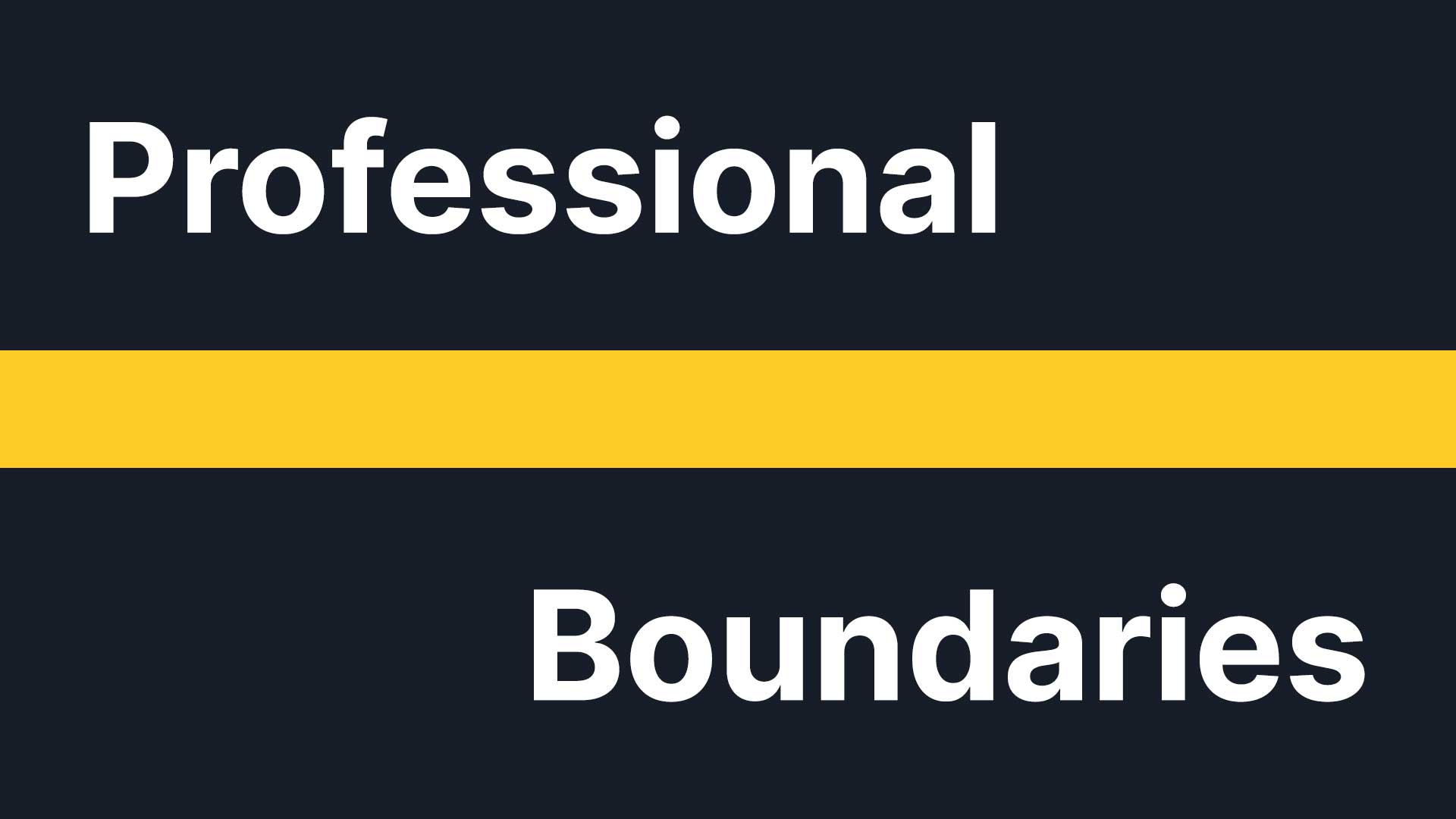Care work requires a level of trust and intimacy unique to the profession.
In a single day, healthcare workers may touch, dress, shower, feed, toilet, speak to, console, cheer up, and listen to one or several clients; no small feat.
Of course, the carer-client relationship also creates an inherent power imbalance. Someone receiving care must be willing to hand over much of their agency and trust to their carers, with the expectation that this relationship is not abused.
The client-carer relationship is a unique one and may be difficult to navigate at times. The following article is intended to help you understand your role as a care provider and how to avoid overstepping both personal and professional boundaries, which may compromise your duty of care.

What are Boundaries?
We all have boundaries. These are the rules that govern how we interact in our relationships with others, indicating what we find to be acceptable and unacceptable behaviours (Bockarova 2016).
Everyone’s boundaries are different. Knowing what your boundaries are comes from a personal sense of self-worth and your values in life. Setting boundaries, however, is not always easy. It is a skill that can take time to get right (Bockarova 2016).
What is a Professional Boundary?
Professional boundaries are rules and limits that prevent the lines between carer and client from becoming blurred.
Professional boundaries are set by legal, ethical, and organisational frameworks to maintain a safe working environment for both the client and the caring staff (Mable 2024; Relationships Australia Victoria 2021).
Some examples of professional boundaries include:
- Not discussing a client’s private health information with others
- Keeping work contact numbers separate From your personal contact numbers
- Not performing additional favours for clients outside of the scope of your role.
(ABIOS 2021)
What is a Personal Boundary?
Personal boundaries may be less explicit than professional boundaries. They may include physical, emotional, and mental limitations, which care workers adopt to protect themselves from being drawn in or becoming overly invested in their clients’ lives (Relationships Australia Victoria 2021).
Personal boundaries allow healthcare workers to maintain psychological safety for themselves and their clients (Relationships Australia Victoria 2021).
Some examples of personal boundaries include:
- Not discussing your personal problems with your client (such as marital or financial issues)
- Not developing feelings of attraction for your client or their family members
- Not worrying about your client once your shift has ended and you have gone home.
(ABIOS 2021)
Professional Boundaries Under the Strengthened Aged Care Quality Standards
Standard 1: The Person - Outcome 1.1 Person-centred care (Action 1.1.4) of the strengthened Aged Care Quality Standards requires staff to maintain professional and trusting relationships with older people - naturally, this involves being mindful of professional boundaries (ACQSC 2024).
Crossing a Boundary

Realistically, boundaries will occasionally be crossed or blurred at various points in a carer-client relationship. This could be due to a particularly difficult situation, stress, bad luck or timing, or even manipulation by a client (Hardy 2017).
In these cases, it’s your responsibility to avoid boundary crossings from becoming a pattern and building into a harmful violation of the relationship (Clarke 2017).
Examples of Boundary Crossings
- Receiving gifts
- Inappropriately disclosing personal information (e.g. phone numbers, addresses)
- Agreeing to socialise outside of the care setting
- Breaching confidentiality
- Inappropriate touching/sexual contact
- Continuing to spend time with a client after your shift has finished
- Introducing clients to your friends and family.
(ABIOS 2021)
Legal and Ethical Standards
Some violations are serious enough to become legal issues and reportable offences. Registered nurses and midwives are subject to the Nursing and Midwifery Board of Australia (NMBA)’s Codes of Conduct. Unregistered care workers are subject to the National Code of Conduct for Health Care Workers. These ethical guidelines are essential to maintaining an adequate level of training and professionalism in the industry.
It is important to note that two sections laid out in the National Code of Conduct for Health Care Workers, in particular, relate specifically to the following professional boundary violations:
Note: The following clauses from the National Code of Conduct for Health Care Workers may differ from your organisation’s own policies and procedures. Always refer to your local guidelines.
Giving and Receiving Gifts or Favours in Healthcare
12. Health care workers not to financially exploit clients
- A health care worker must not financially exploit their clients.
- Without limiting subclause (1):
- a health care worker must only provide services or treatments to clients that are designed to maintain or improve clients’ health or wellbeing
- a health care worker must not accept or offer financial inducements or gifts as a part of client referral arrangements with other health care workers
- a health care worker must not ask clients to give, lend or bequeath money or gifts that will benefit the health care worker directly or indirectly.
Sexual Relationships in Healthcare
13. Health care workers not to engage in sexual misconduct
- A health care worker must not engage in behaviour of a sexual or close personal nature with a client.
- A health care worker must not engage in a sexual or other inappropriate close personal, physical or emotional relationship with a client.
- A health care worker should ensure that a reasonable period of time has elapsed since the conclusion of the therapeutic relationship before engaging in a sexual relationship with a client.
(HCC 2019)
Protecting Your Professional Boundaries
The key to managing many of these boundaries is understanding the difference between a professional and a personal relationship and ensuring that your behaviour always remains on the right side of the line (Hardy 2017).
If you are unsure if what you are doing is crossing a boundary, ask yourself these five questions:
1. What is my role in this situation?
For example, are you acting as a caregiver or a friend?
2. Am I sharing personal information for my benefit or for the benefit of the person I’m helping?
Sharing information about yourself can significantly help the engagement process (building trust). However, it depends on the information and the context of the disclosure.
3. Are my emotions clouding the issue with the person I am caring for?
Sometimes we develop a strong like or dislike for someone we are helping (transference/countertransference). If your emotions cloud your judgment, step back and, if possible, consider having another person step in.
4. Are the other person’s emotions clouding the issue with me?
If you are setting off strong (positive or negative) emotions in the person you are helping, you might want to consider passing them to someone else, particularly if the person you are helping expresses strong romantic, sexual or aggressive feelings toward you.
5. If in doubt, don’t!
If you’re unsure whether you should say hi to someone you only know as their carer when you’re out with your family, don’t.
If you’re unsure whether or not to put your hand on their forearm to comfort them, don’t.
If you’re unsure whether sharing an anecdote about yourself would be helpful, don’t.
(Ausmed 2019)
Test Your Knowledge
Question 1 of 2
Which one of the following examples do NOT indicate a crossed boundary?
Topics
References
- Acquired Brain Injury Outreach Service 2021, Building Good Boundaries in Support Work, Queensland Government, viewed 26 March 2024, https://www.health.qld.gov.au/__data/assets/pdf_file/0018/381060/boundaries_pro.pdf
- Aged Care Quality and Safety Commission 2024, Standard 1: The Individual, Australian Government, viewed 26 March 2024, https://www.health.gov.au/resources/publications/strengthened-aged-care-quality-standards-august-2025?language=en
- Ausmed 2019, Are You Crossing a Boundary?|Ausmed Explains…, online video, 18 September, YouTube, viewed 26 March 2024, https://youtu.be/NDZZe2Ygpr0?si=uhamgWq_bVnJZcAk
- Bockarova, M 2016, ‘4 Ways to Set and Keep Your Personal Boundaries’, Psychology Today, 1 August, viewed 26 March 2024, https://www.psychologytoday.com/au/blog/romantically-attached/201608/4-ways-set-and-keep-your-personal-boundaries
- Clarke, K 2017, 'Boundaries: Creating a Safe Space to Change', Ausmed, 13 December, viewed 29 August 2019 [no longer online].
- Hardy, R 2017, ‘Top Tips on Managing Professional Boundaries in Social Work’, Community Care, 19 June, viewed 26 March 2024, https://www.communitycare.co.uk/2017/06/19/top-tips-managing-professional-boundaries-social-work/
- Mable 2024, How to Maintain Professional Boundaries with Your Client, Mable Technologies Pty Ltd., viewed 26 March 2024, https://mable.com.au/discover/support-worker-guide-to-mable/professional-boundaries/
- Relationships Australia Victoria 2021, Maintaining Personal and Professional Boundaries, Relationships Australia Victoria, viewed 26 March 2024, https://www.relationshipsvictoria.org.au/media/g10lkvqa/maintaining-professional-boundaries-tip-sheet-21079-web.pdf
 New
New 
